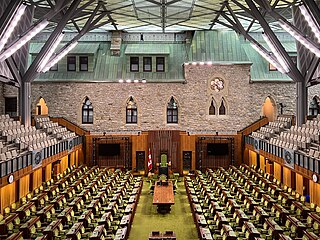
The House of Commons of Canada is the lower house of the Parliament of Canada. Together with the Crown and the Senate of Canada, they comprise the bicameral legislature of Canada.

The Senate of Canada is the upper house of the Parliament of Canada. Together with the Crown and the House of Commons, they comprise the bicameral legislature of Canada.

The minister of Canadian heritage is the minister of the Crown who heads Canadian Heritage, the department of the Government of Canada responsible for culture, media, sports, and the arts.

The minister of national defence is a minister of the Crown in the Cabinet of Canada responsible for the management and direction of all matters relating to the national defence of Canada.

The minister of innovation, science, and industry is the minister of the Crown in the Canadian Cabinet who is responsible for overseeing the economic development and corporate affairs department of the Government of Canada; Innovation, Science and Economic Development Canada.

The minister of public safety is the minister of the Crown in the Canadian Cabinet responsible for overseeing Public Safety Canada, the internal security department of the Government of Canada. The portfolio succeeded the role of solicitor general of Canada in 2005.
The president of the Treasury Board is a minister of the Crown in the Canadian Cabinet. The president is the chair of the Treasury Board of Canada and is the minister responsible for the Treasury Board Secretariat, the central agency which is responsible for accounting for the Government of Canada's fiscal operations.
The minister of public services and procurement is the minister of the Crown in the Canadian Cabinet who is responsible for overseeing the Government of Canada's "common service organization", an expansive department responsible for the internal servicing and administration of the federal government. A flavour for the department is given by the list of acts and regulations for which it is responsible.

The Broadcasting Act, given royal assent on 1 February 1991, is an act of the Parliament of Canada regarding broadcasting of telecommunications in the country.
The committees of the Australian Senate are committees of Senators, established by the Australian Senate, for purposes determined by that body. Senate committees are part of the operation of the Australian parliament, and have for some decades been involved in maintenance of government accountability to the Australian parliament, particularly through hearings to scrutinise the budget, and through public inquiries on policy questions.
The Seafarers International Union of Canada (SIU) is a Canadian labour union representing seafarers working aboard Canadian flag vessels. The Seafarers’ International Union of Canada is affiliated with the Seafarers’ International Union of North America serving unlicensed sailors since 1938. The SIU has been representing seafarers working aboard vessels on the Great Lakes, St. Lawrence River, East Coast, West Coast and Arctic since 1954. SIU members have acquired the reputation of being amongst the best-trained and most qualified sailors in the world. The SIU represents thousands of qualified seafarers across Canada.
The House of Commons Standing Committee on National Defence (NDDN) is a standing committee of the House of Commons of Canada. Prior to 2007, it was the House of Commons Standing Committee on National Defence and Veterans' Affairs.
The Standing Committee on Citizenship and Immigration (CIMM) is a standing committee of the Canadian House of Commons that studies issues related to citizenship and immigration in Canada.
The House of Commons Standing Committee on Health (HESA) is a standing committee of the House of Commons of Canada.

Karen Ludwig is a Canadian Liberal politician who represented the riding of New Brunswick Southwest in the House of Commons of Canada from 2015 until 2019. She was the first woman to represent the riding.

Michael J. Cooper is a Canadian politician who was first elected to represent the riding of St. Albert—Edmonton in the House of Commons of Canada in the 2015 federal election. Cooper was re-elected in both the 2019 and 2021 federal elections and currently serves as the Conservative Shadow Minister for Democratic Reform. Prior to entering politics, Cooper worked as a civil litigator at a law firm in Edmonton. He is a lector at St. Albert Parish and a member of the Knights of Columbus, St. Albert Rotary Club and St. Albert District Chamber of Commerce.

Anita M. Vandenbeld is a Canadian politician, who was elected to represent the riding of Ottawa West—Nepean for the Liberal Party of Canada in the House of Commons of Canada in the 2015 Canadian federal election. She was re-elected in the same riding in 2019, and re-elected in 2021.

John Nater is a Canadian politician. He is currently serving as the Member of Parliament for the riding of Perth—Wellington in the House of Commons of Canada.

Iqra Khalid is a Pakistani Asian-Canadian politician who was elected to represent the riding of Mississauga—Erin Mills in the House of Commons of Canada in the 2015 federal election.

The Online Streaming Act, commonly known as Bill C-11, is a proposed bill introduced in the 44th Canadian Parliament. It was first introduced on November 3, 2020, by Minister of Canadian Heritage Steven Guilbeault during the second session of the 43rd Canadian Parliament as An Act to amend the Broadcasting Act and to make related and consequential amendments to other Acts, commonly known as Bill C-10, which passed in the House of Commons on June 22, 2021, but failed to pass the Senate before Parliament was dissolved for a federal election. It was reintroduced with amendments as the Online Streaming Act during the first session of the 44th Canadian Parliament in February 2022, passed in the House of Commons on June 21, 2022, and passed in the Senate on February 2, 2023. As of February 2023, amendments made to the text of the bill in the Senate are being considered by the House of Commons.











